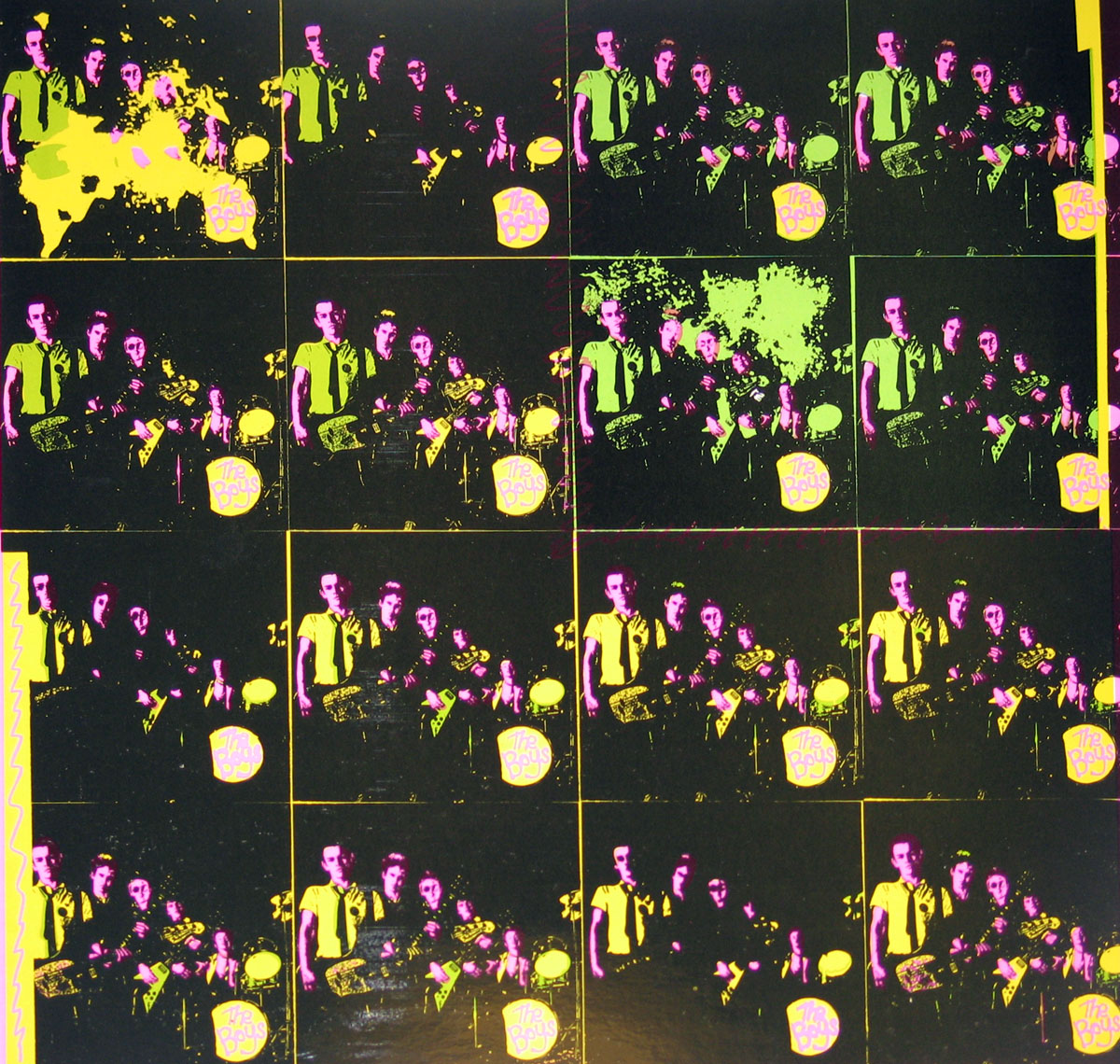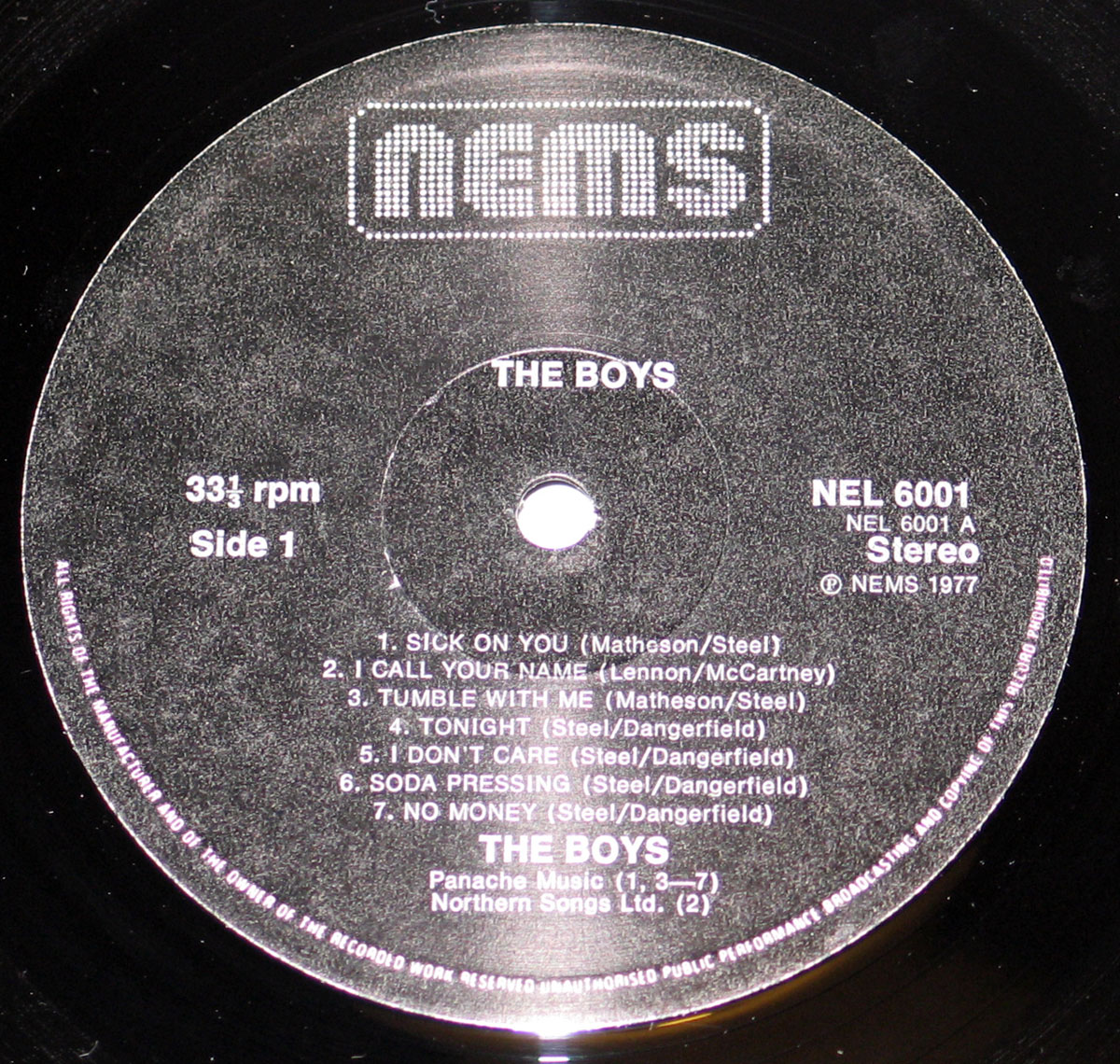The Boys - Self-titled, Punk Nems Nel 6001 12" Vinyl LP Album
The Boys signed to NEMS in January 1977, this record is the original UK pressing
The Boys signed to NEMS in January 1977, this record is the original UK pressing
In the smoldering wreckage of 1977, a year when the Sex Pistols were pissing off the Queen and rock was bloating into arena-sized dinosaur farts, a band called The Boys dropped their self-titled debut like a bomb into the complacent scene. Forget your preconceived notions about punk rock, kids, because these London lads were doing it before it even had a name.
This wasn't the sneering, spitting nihilism that became punk's calling card. No, The Boys were tapping into the raw energy of early rock 'n' roll, the kind that made your parents clutch their pearls and your hips involuntarily swivel. But with a sneering, spitting delivery that said, "We're taking this back, and we don't give a damn what you think."
From the opening chords of "Sick on You," it's a full-throttle assault of guitars that sound like they're being played with broken bottles, drums that pummel like a drunken brawl, and vocals that snarl and seduce in equal measure. It's a sonic middle finger to the prog rock noodlers and disco divas who had hijacked rock's primal energy.
And it's not just the sound that's a revelation. The Boys were delving into themes of teenage angst, disillusionment, and rebellion with a poetic sensibility that elevated them above the average three-chord thrashers. There's a darkness lurking beneath the surface, a sense of danger that made parents lock up their daughters and record executives lock up their checkbooks.
The album was produced by the legendary Vic Maile, who somehow managed to capture the band's raw energy in the studio without sacrificing any of the visceral punch. Recorded at Pathway Studios, the sessions were fueled by equal parts youthful exuberance and a healthy dose of amphetamines. The result is a sound that's both immediate and timeless, capturing a moment in time when a bunch of kids were trying to set the world on fire with their guitars.
And while The Boys may not have achieved the same level of notoriety as some of their punk peers, their influence is undeniable. They were pioneers, blazing a trail for countless bands who followed in their wake. Their debut album is a testament to their talent, their passion, and their refusal to conform to anyone's expectations.
In the grimy underbelly of London, circa 1976, a band of misfits named The Boys were brewing a musical revolution in their parents' garages. While the rock establishment was busy churning out bloated concept albums and disco was infecting the airwaves like a particularly nasty strain of herpes, these four lads were conjuring a raw, explosive sound that would shake the foundations of the music scene.
Formed from the ashes of previous bands and fueled by a shared love of early rock 'n' roll and a healthy disdain for the status quo, The Boys quickly established themselves as a force to be reckoned with. They honed their sound in dingy pubs and clubs, their raucous performances attracting a growing legion of fans who craved something real, something visceral, something that spoke to their own teenage angst and frustration.
Led by the charismatic Matt Dangerfield on vocals and guitar, the band also featured the guitar wizardry of Honest John Plain, the thumping bass lines of Casino Steel, and the frenetic drumming of Jack Black (no, not THAT Jack Black). Together, they forged a sound that was equal parts Chuck Berry and the Ramones, a heady mix of rockabilly swagger and punk rock fury.
Their debut single, "I Don't Care," released on their own label in 1977, was a declaration of independence, a middle finger to the music industry machine. It was a raw, unpolished gem that captured the band's youthful energy and irreverent spirit.
Soon after, they signed with NEMS Records, a label run by the infamous Sex Pistols manager Malcolm McLaren. This partnership would prove to be both a blessing and a curse. While it gave The Boys the exposure they needed, it also led to them being unfairly labeled as a Pistols knock-off, a tag they never quite managed to shake off.
Despite the challenges, The Boys continued to churn out a string of critically acclaimed albums throughout the late '70s and early '80s. They toured relentlessly, sharing stages with the likes of The Jam, The Clash, and Ramones, their electrifying performances leaving audiences breathless and begging for more.
But commercial success proved elusive, and internal tensions eventually led to the band's demise in 1982. While they may not have achieved the same level of fame as some of their punk peers, their influence on the music scene is undeniable.
The Boys were pioneers, blazing a trail for countless bands who followed in their wake. Their music was a raw, unfiltered expression of teenage angst and rebellion, a soundtrack for a generation that was fed up with the hypocrisy and conformity of the adult world.
While their time in the spotlight may have been brief, their legacy lives on. The Boys' music continues to inspire and resonate with new generations of music fans who are drawn to their raw energy, their uncompromising spirit, and their refusal to bow down to the demands of the music industry machine.
They may not have become the rock gods they dreamed of, but The Boys will forever be remembered as punk rock royalty, a band that burned brightly and left an indelible mark on the music world.
Music Genre: Punk Rock |
Record Label & Catalognr: NEMS NEL 6001, Panache Music |
Media Format: 12" Vinyl LP Record 160 grams vinyl |
Year & Country: 1977 Made in Gt Britain |
Band Members and Musicianson: The Boys - Self-titled, Punk Nems Nel 6001 |
Complete Track Listing of: The Boys - Self-titled, Punk Nems Nel 6001 |
Photos of the LP's cover: The Boys - Self-titled, Punk Nems Nel 6001 |
| Photo of The Boys - Self-titled, Punk Nems Nel 6001 Album's Front Cover |
 |
Photo of The Boys - Self-titled, Punk Nems Nel 6001 Record Label
|

|
Note: The images on this page are photos of the actual album. Slight differences in color may exist due to the use of the camera's flash. Images can be zoomed in/out ( eg pinch with your fingers on a tablet or smartphone ). |